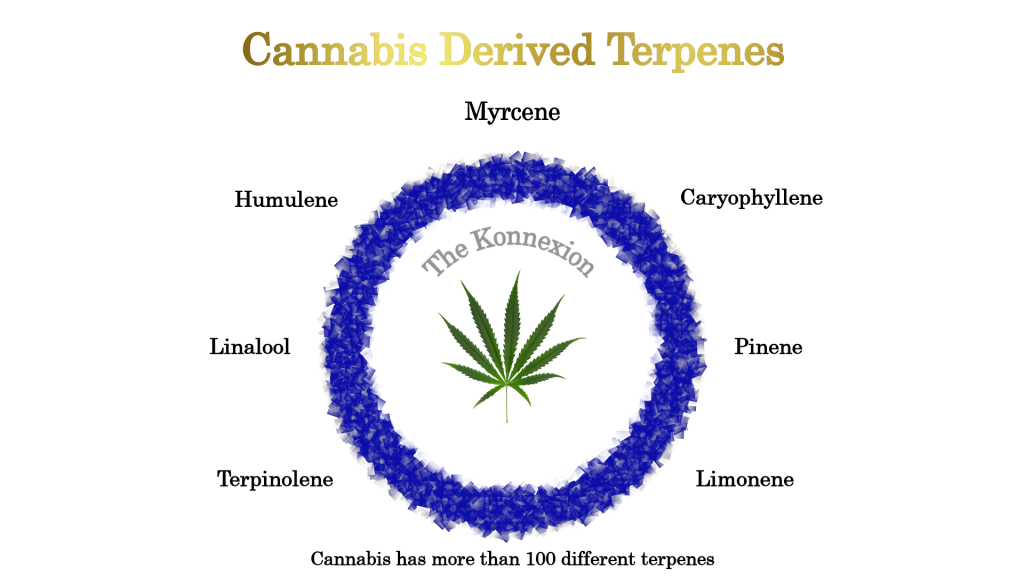Iowa City (319) 321-6401 |

Brunei Kratom: A Comprehensive Guide to Effects and Dosage
Imagine navigating the dense rainforests of Brunei, uncovering the hidden

In recent years, cannabis has become incredibly popular due to its potential medical and therapeutic uses. Although the majority of people only associate cannabis with its euphoric effects, the plant’s complex chemical composition is what gives it its distinctive effects. Terpenes are one such class of cannabis-found substances that have attracted attention for their potential as therapeutics.
Cannabis contains terpenes, which are aromatic organic substances that are present in many plants. These substances not only give cannabis strains their distinctive flavor and aroma, but they also have a number of possible health advantages. Terpenes from cannabis plants are extracted and used in a variety of products for their medicinal effects.
This article will delve into the realm of terpen’s derived from cannabis. This includes what they are, how they are extracted, what uses they may have, how to utilize them, and any potential hazards. Whether you’re a healthcare professional or a curious consumer, keep reading to find out more about cannabis-derived terpenes and their potential medicinal benefits.
Table of Contents:
Terpenes derived from cannabis are organic substances that are taken from the cannabis plant. These substances are recognized to have potential medicinal qualities and are what give each cannabis strain its distinct flavor and scent. Although terpenes are present in many other plants besides cannabis, they are especially referred to as cannabis-derived terpenes when they come from cannabis plants. They are removed from the plant material using a variety of techniques, such as solvent extraction, CO2 extraction, and steam distillation. For their potential health benefits, these extracted terpenes are employed in a variety of goods, such as edibles, topicals, and vaporizers.
The cannabis plant’s essential compounds, called terpenes, are responsible for its flavor and scent. These are crucial to the entourage effect. This is a phenomenon in which several cannabis compounds interact to have a stronger medicinal impact as a group than any one ingredient acting alone.
Many studies have demonstrated that terpenes can have positive impacts on the body and psyche. They also have special medicinal qualities. For instance, whereas some terpenes are known to have soothing or energizing effects, others are known to have anti-inflammatory characteristics. They can also help with mood enhancement, stress reduction, anxiety reduction, and even sleep.
Terpenes can also impact how the body responds to THC (tetrahydrocannabinol) and CBD (cannabidiol). Certain terpenes may intensify these chemicals’ euphoric effects, while others may lessen them.
Terpenes are the key to the cannabis plant’s total therapeutic potential. Unlocking the full potential of this plant as a natural treatment requires an awareness of its special qualities and effects.
Cannabis contains terpenes, which are organic substances that are present in a variety of plants. They are in charge of giving each plant its own characteristic flavor and aroma, and by luring pollinators with their fragrance, they play a crucial part in pollination. Isoprene units, which are five-carbon building blocks that can be combined in a variety of ways to make a wide spectrum of terpene molecules, are the building blocks from which terpenes are created.
Terpenes in cannabis collaborate with cannabinoids like THC and CBD to create a variety of medicinal benefits. Terpenes are crucial to the entourage effect, in which the various components of cannabis work together to provide a more powerful therapeutic impact than any one component acting alone.
There are many other plants in addition to cannabis that contain terpenes. Also, they are employed in a number of fields, such as food and beverage manufacturing, cosmetics, and fragrances.
Cannabis has more than 100 different terpenes, and each strain has a certain terpene profile that gives it a unique scent and flavor. Some of the common terpenes found in cannabis include:

These are just a few of the many terpenes that can be found in cannabis. Every strain has a different terpene profile, which may influence how potently medicinal it is.
Terpenes that are extracted from the cannabis plant are referred to as cannabis-derived terpenes. Several techniques, including steam distillation, cold pressing, and solvent extraction, are used to extract these terpenes. Terpenes that can be applied in a variety of ways are concentrated in the final extract.
Terpenes from cannabis are frequently employed in the manufacture of cannabis products, such as oils, tinctures, edibles, and topicals. They are added to these items to improve their flavor and aroma, and they may also help them have more medicinal effects.
Terpenes extracted from cannabis are employed in a variety of other industries in addition to cannabis goods, including food and beverage manufacture, fragrance, and cosmetics. They can be used to generate intricate and nuanced scent and flavor profiles and are renowned for their distinctive aroma and flavor features.
The quantity and composition of terpenes obtained from cannabis might vary depending on the extraction process and the plant material used as a source. For terpenes to be safe and effective, they must be made from pure, high-quality cannabis.
The term “entourage effect” describes the potential synergistic effects that can happen when different cannabis constituents, such as terpenes and cannabinoids, interact to provide a stronger effect than if they were used separately.
The complicated interactions between the numerous cannabis components, which can control and increase each other’s effects, are thought to be the cause of the entourage effect. Terpenes, for instance, may interact with body receptors or alter the permeability of cell membranes to increase the absorption and activation of cannabinoids.
Research has shown that the diverse medicinal effects of whole-plant cannabis extracts, which contain a variety of cannabinoids and terpenes, may be due to the entourage effect. Comparing whole-plant extracts to isolated chemicals, it has been discovered that they may be more effective and cause fewer negative effects.
The entourage effect is a crucial idea in the study and development of cannabis, and it emphasizes the advantages of employing whole-plant extracts or mixtures of cannabinoids and terpenes to possibly improve the medicinal effects of cannabis products.
Terpenes produced from cannabis have been discovered to possibly provide a number of health advantages, which may include:
Cannabis-derived terpenes can be used in various ways, depending on the desired effect and application. Some common ways to use cannabis-derived terpenes include:
It’s vital to remember that using terpenes generated from cannabis should be done with caution, and users should always adhere to the recommended dosage and usage instructions. Furthermore, it’s critical to confirm that the terpenes are devoid of contaminants and impurities and come from a reliable provider.
Terpenes made from cannabis might provide health advantages, but it’s vital to be informed of any hazards and safety precautions before using them. These dangers and safety measures may include:
Potential side effects of terpenes
While terpenes generated from cannabis may have health advantages, it’s crucial to be aware of any possible negative effects that could result from their use. The following are a few possible negative consequences of cannabis-derived terpenes:
Terpenes made from cannabis should be used sparingly at first, and any negative effects should be carefully monitored. If any adverse effects occur, it’s crucial to stop using the medication and consult a doctor if the symptoms continue or get more severe.
Terpenes from cannabis are a large and complicated class of chemical substances that are present in cannabis and other plants. These terpenes have a variety of potential health advantages and medicinal applications, and more people are turning to them as a natural substitute for medications.
Terpenes derived from cannabis should be extracted and used with care, and the right procedures should be followed to assure safety and reduce the possibility of negative side effects. Terpenes derived from cannabis, however, can be an effective and reliable way to support general health and wellbeing.
It’s probable that we will continue to learn more about these fascinating molecules and their ability to assist health and healing in a number of ways as research into the potential advantages and uses of cannabis-derived terpenes expands.

Imagine navigating the dense rainforests of Brunei, uncovering the hidden

Have you ever wondered why Trainwreck Kratom has sparked such

To effectively combat headaches, specific Kratom strains stand out for
Subscribe for exclusive deals and updates!
